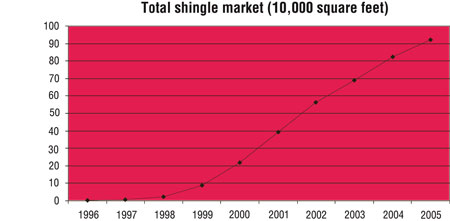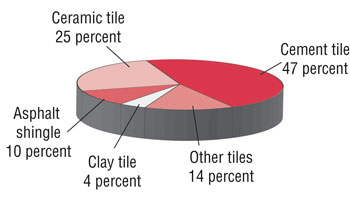Asphalt shingles are one of the most widely used steep-slope materials in the U.S. roofing market. But five years ago, you wouldn't have found asphalt shingles in China. Now, asphalt shingles have made prominent progress in the Chinese market in part because of advocation and promotion by companies such as Owens Corning, Toledo, Ohio; CertainTeed Corp., Valley Forge, Pa.; and GAF Materials Corp., Wayne, N.J. Asphalt shingles have been accepted and applied extensively by local governments and developers of some regions, and continued growth is expected during the next several years.
Beyond the basics
Growth of new residential steep-slope construction—especially in Chinese cities—has been keeping pace with the Chinese economy's fast development. During recent years, the completed housing area has reached about 14 billion square feet per year in China. The average increase of property in cities is 15 percent each year. In 2005, the area of new residential construction in cities totaled about 4.8 billion square feet.
Generally no more than three stories high, residential buildings in rural areas basically are constructed with brick and wood or brick and concrete. Sixty percent of those buildings have steep-slope roofs. In medium- and small-sized cities, most residential buildings are five stories to seven stories high and brick-concrete structures, and in big cities, residential buildings mostly are more than 10 stories high and brick-concrete structures, generally with concrete roofs.
In the past, the basic requirements for building design in China have been cost efficiency, applicability and beauty, of which beauty has been the least emphasized requirement. Aesthetic value only is discussed after functional needs have been satisfied. Moreover, it is believed low-slope roofs save materials and cost and reduce waste. Therefore, most residential buildings were built as low-slope structures before 2000. Since the 1990s, with the development of the Chinese economy and constant improvement of standards of living, the government and building experts have realized steep-slope roofs have distinct advantages with regard to aesthetic qualities of buildings and cities, use of building space and improving waterproofing performance. With support from various parties—such as the government, experts and manufacturers—more steep-slope roofs are being installed on new construction projects. Currently, about 70 percent of new residential buildings have steep-slope roofs.
However, China's modern advances are rooted in its history, and history has helped shape the current Chinese steep-slope roofing market.
For example, tile application in China can be traced back more than 2,000 years. Bricks and tiles were used widely during the Qin and Han dynasties. Clay tiles are used most in China, with average use being 50 million tiles each year; small black clay tile has the longest history and is most widely used followed by ceramic tile and glazed tile.
Then, during the early 1990s, asphalt shingles emerged in the Chinese market.

How the shingle market in China has grown during the years
Marketing and promotion
Chinese customers are used to traditional hard tiles because of Chinese history and building traditions. When asphalt shingles were introduced, they did not offer great variety and had poor color retention. There also was a lack of careful and detailed marketing planning. Therefore, market acceptance of asphalt shingles was slow in the beginning.
However, during the late 1990s, Owens Corning brought its products to the Chinese asphalt shingle market, initiating marketing programs in Shanghai and Dalian and expanding to the northern and eastern coastal areas of China. Since 2000, to find a good market for asphalt shingles, Owens Corning has launched large-scale marketing programs in China's major coastal cities targeting architects and developers. But even now, most developers, who play a dominant role in the Chinese property industry, are not familiar with building materials from abroad. In 2002 alone, the professional attendance at Owens Corning's marketing programs was more than 4,000. As a result, customers learned more about asphalt shingles, and shingles were being installed on more steep-slope roofs.
Presently, colored asphalt shingles mainly are used for new construction properties and roof conversion programs in cities. Laminated shingles mostly are used for detached and semi-detached villas, and three-tab shingles are used for multistory houses and a small number of high-rise buildings. In addition, asphalt shingles now are being used in some wealthy rural areas of east China.
Asphalt shingles sold in the Chinese market mainly are made in the U.S. Major brands include Owens Corning; CertainTeed; GAF Materials; Pabeco UK Ltd., London; IKO Industries Ltd., Brampton, Ontario, Canada; and Tegola Canadese, Vittorio Veneto, Italy. With the rapid increase of asphalt shingle use, a large number of Chinese companies—especially waterproofing manufacturers—have joined the competition. These companies grow quickly and occupy most of the market share in the low-end asphalt shingle market.
Training
Because asphalt shingles are new to China, roofing contractors know little about shingle features and installation requirements, and developers worry about the shingles' waterproofing performances. To solve this problem, Owens Corning has offered two solutions for the Chinese market.
Owens Corning provides training for roofing contractors who have established long-term cooperation with Owens Corning's distributors. With this agreement, distributors directly sign a general contract covering shingle product supply and installation with the necessary parties and hire roofing contractors to do the job. The roofing contractors receive payment from the distributors.
In addition, manufacturers and distributors provide installation training and on-site guidance for roofing contractors designated by building owners. Typically, these contractors are experienced and specialized in waterproofing material installation and quickly can have a thorough grasp of shingle installation techniques.
The shingle installation code and acceptance code are being formulated in China. Currently, the installation requirements and acceptance standards of manufacturers are followed in the marketplace. There have been some local standard drawings detailing shingle installation. Installation inspectors and building owners execute quality control and acceptance according to manufacturers' standards or details.
Roof conversion projects
Before 2000, most new construction buildings had low-slope roofs with little or no insulation on roofs and in walls. In 2000, the Shanghai government planned to convert the low-slope roofs on old buildings in urban areas to steep-slope roofs. The purpose of the roof conversion program is to promote the living conditions of residents on the top floors of buildings by improving the waterproofing and insulating performances of low-slope roofs. With government support, Owens Corning offered a solution of combining asphalt shingles with lightweight steel structures for the conversion program to reduce weight load, improve waterproofing performance and beautify the city. The plan won high praise among various parties—including customers, experts and government—immediately after it was introduced. Since 2000, roof conversion has been conducted on about 1,500 old residential buildings each year in Shanghai. The conversions quickly were introduced in many other cities, such as Beijing, Guangzhou, Hangzhou, Nanjing, Qingdao and Suzhou.
Successful promotion
Although asphalt shingles are believed to be a good product, traditional design and consumption habits make it difficult for asphalt shingles to be widely accepted in China. It is important for shingle manufacturers to communicate with government officials and allow them to have a full understanding of the product through a series of public relations campaigns with support from related associations and organizations.
Active participation in drafting national standards and codes for products, product design and installation also is important for promotion of asphalt shingles. National standards and codes have stringent restrictions on building design, products and installation in China. A product must meet the corresponding national standard and satisfy the requirements of the related design and application codes before it can be used.
Many Chinese building product standards are equal to advanced international standards such as European and ASTM International standards. Educating Chinese standard drafters about international standards also is a way for manufacturers to participate. This includes introducing product features, application techniques and test methods to drafters; inviting roofing professionals to visit labs, plants and job sites abroad; and holding technical and marketing seminars. The current Chinese asphalt shingle standard significantly references ASTM International requirements in many aspects, including wind-uplift testing. A wind-uplift test lab has been set up in China.
Finally, it is imperative to stress the importance of installation training. With no roofing contractors specializing in asphalt shingles in China, most roofing work is performed by waterproofing contractors or waterproofing teams of construction companies, which can make installation training difficult. Organized by shingle manufacturers and distributors, training still is on a primary level. The next step is to incorporate shingle installation into the vocational certificate system of the building industry through application from related associations, such as the China National Waterproof Building Materials Industry Association. Then, regular training and examination will be organized to improve installation quality.

A breakdown of roofing materials used in China during 2005
The future
China continues to make advances with regard to the asphalt shingle market. Although it may take time, promotion and marketing of asphalt shingles by certain companies have helped establish a presence for asphalt shingles in China. If contractors are trained properly, asphalt shingles could become a key component of roofing in China.
Dongqing Zhu is executive vice president and secretary general of China National Waterproof Building Materials Industry Association and a member of NRCA's International Relations Committee.
COMMENTS
Be the first to comment. Please log in to leave a comment.